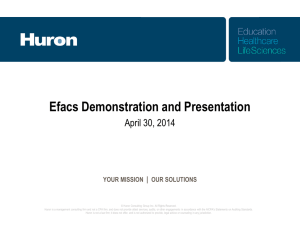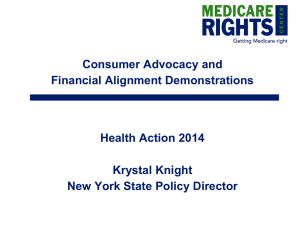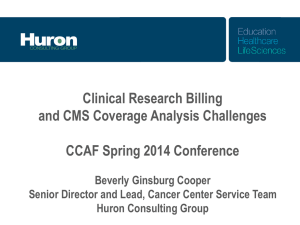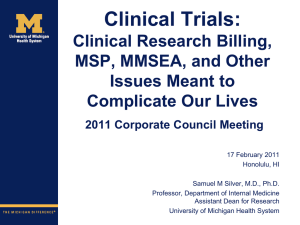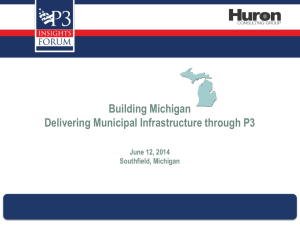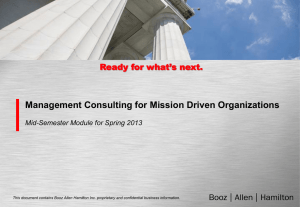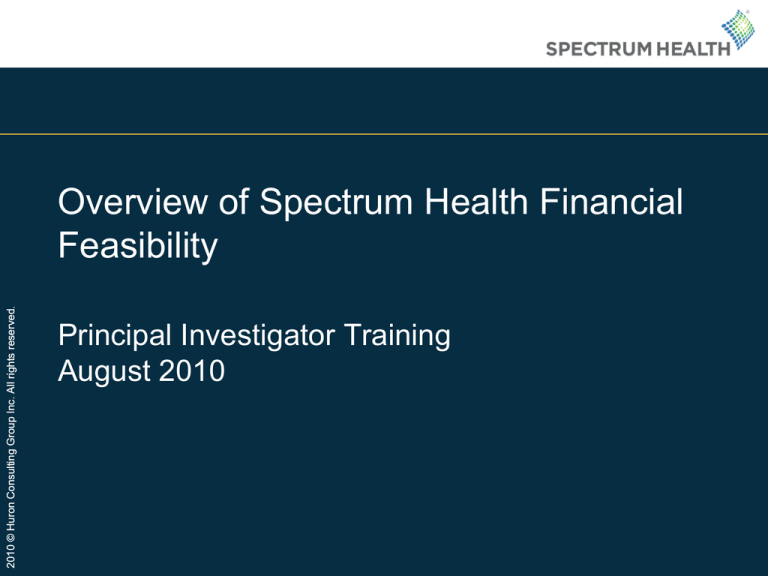
2010 © Huron Consulting Group Inc. All rights reserved.
Overview of Spectrum Health Financial
Feasibility
Principal Investigator Training
August 2010
2010 © Huron Consulting Group Inc. All rights reserved.
Objective
To introduce
the Feasibility
Review
Process
• What is a Feasibility
Coverage Analysis?
• Why should Spectrum
Health conduct the
analysis?
• What are the benefits of
the analysis?
To build a
basic
understanding
of Medicare’s
research
billing rules
• Centers for Medicare
and Medicaid Services
(CMS) Clinical Trial
Policy (CTP)
• CMS IDE Device Billing
Regulations
The Goals of
Today’s
Training
2
2010 © Huron Consulting Group Inc. All rights reserved.
Agenda
1.
Outline the Feasibility Coverage Analysis (FCA)
2.
Explain CMS Guidance on Reimbursement for Clinical
Trials
3.
Describe Medicare’s Approval Process for Investigational
Device Trials
4.
Describe Spectrum Health’s Plan for Compliance with
Medicare Regulations for Clinical Research
3
2010 © Huron Consulting Group Inc. All rights reserved.
The Feasibility Coverage Analysis (FCA)
A feasibility coverage analysis is a systematic review of
protocol-related documents to determine if all the patient
care costs in a study are covered by the study sponsor,
other funding sources, or qualify for reimbursement by third
party payers.
4
Three Benefits of Conducting a FCA
2010 © Huron Consulting Group Inc. All rights reserved.
1.
2.
5
Early detection of items and services not covered by Medicare
a)
Develop a spreadsheet of all the patient care costs in the study.
b)
Determine if the trial qualifies for reimbursement under Medicare’s
criteria.
c)
Identify costs not covered by insurance or the study sponsor.
Development of a tool to ensure compliant claims processing
a)
Identify the claims to be split before billing.
b)
Identify the services that need research specific codes and/or modifiers.
c)
Identify the charges to be submitted to the study sponsor.
Three Benefits of Conducting a FCA, Cont’d
3. Medicare’s expanded coverage of clinical trials means increased opportunities
for reimbursement of the following:
2010 © Huron Consulting Group Inc. All rights reserved.
a) Services typically provided to patients with the disease under study (e.g.
conventional care).
b) Services provided to administer a drug, implant a medical device, or deliver a
service.
c) Clinically appropriate monitoring of the drug, medical device or service.
d) Prevention, diagnosis, and/or treatment of complications.
6
Environment for Research Compliance
Regulatory climate for clinical research billing compliance
2010 © Huron Consulting Group Inc. All rights reserved.
CMS created an integrated data repository for Medicare, Medicaid, and
liability claims data to be used in identifying improper payments1.
■
A standardized approach to billing for Medicare, Medicaid, and
commercial payers is preferred
■
Double-billing must be prevented
Health care reform legislation requires the following:
■
Commercial payers to cover routine care for some research2.
■
Increased funding for Medicaid fraud and abuse control
1
CMS Integrated Data Repository (IDR) Overview, www.cms.gov/IDR/ .
2
Section 10103 of the Patient Protection and Affordable Care Act (PPACA).
Example FCA Grid – Outpatient Drug Study
2010 © Huron Consulting Group Inc. All rights reserved.
These will be billed to
the third party payer.
This will be billed to the
research account and
potentially the sponsor .
Example FCA Grid - Inpatient Device Study
2010 © Huron Consulting Group Inc. All rights reserved.
This will be
billed to the
third party
payer.
These costs will
not be billed.
These will be billed
to the third party
payer as a part of
the DRG.
DRAFT - Confidential - Attorney Client Privileged - Attorney Work Product
Completing the FCA
2010 © Huron Consulting Group Inc. All rights reserved.
Spectrum Health requires an FCA for all new studies with patient care costs
(excluding chart reviews and retrospective studies). IRB approvals will be
held until the Feasibility Review is completed.
SC and PI Draft the FCA and Submit
to Research Finance (RF)
RF Reviews the FCA and Assesses
the Budget
Feasibility Approval is Needed
Before IRB Approval Letters Can Be
Released
Drafting the FCA
2010 © Huron Consulting Group Inc. All rights reserved.
Steps
1.
Study Coordinator (SC) documents the study identifying information
2.
SC drafts the Feasibility Grid using the protocol schedule of events
3.
SC consults the Principal Investigator to identify services that are solely for
research purposes versus those that are for one of the following reasons:
■
Medical Management of the patient
■
Prevention, diagnosis, or treatment of complications
■
Administration of an investigational item or service
4.
SC assigns a preliminary designation to each service using the options on
the next page
5.
SC completes the Device or Drug/Procedure study tabs, as appropriate
6.
PI and SC submit the analysis to bethany.stanisiewski@spectrumhealth.org and debra.vandyken@spectrum-health.org.
2010 © Huron Consulting Group Inc. All rights reserved.
Potential Designations for the FCA
Code
Description
Example
SH
Technical Fee provided at one of Spectrum Health Hospitals
that is potentially billable.
CBC
SP
Professional Fee provided by a Spectrum Health Physician
that is potentially billable.
Physical Exams
AP
Clinical service provided by an affiliate hospital or physician
Any service
S/D
Professional or Technical Fee provided for research
purposes only. This service will be paid by the study sponsor
or clinical department.
Biomarker analysis
A
Administrative costs that will not appear on a bill or generate
a charge.
Administering questionnaires
Please note: There may be instances when using more than one code is appropriate. For example, with a
CT scan, there is a professional and technical fee associated with it. So it would have at least two codes if
the scan was completed at a Spectrum Hospital.
RA Office Review of the FCA
2010 © Huron Consulting Group Inc. All rights reserved.
Once the FCA is completed by the research team, the RA Office
completes the following steps:
1.
Reviews the FCA for completeness and accuracy
2.
Validates qualifying status of the study
3.
Verifies CPT/HCPCS codes for items and services, where
relevant
4.
Reviews Medicare guidance on reimbursement for routine items
and services
5.
Drafts the budget
6.
Provides feedback to the research team
7.
Approves the FCA
Comprehension Question 1
2010 © Huron Consulting Group Inc. All rights reserved.
Which statement is NOT a benefit of the FCA?
a.
Early detection of items and services not covered by Medicare.
b.
Development of a tool to ensure compliant claims processing.
c.
Identifying increased opportunities for reimbursement of
complications related services.
d.
Identifying research participants.
Comprehension Question 2
2010 © Huron Consulting Group Inc. All rights reserved.
Which statement is NOT true?
a.
Spectrum Health requires an FCA on all existing studies.
b.
Spectrum Health requires an FCA on all new studies.
c.
Feasibility approval is needed before the IRB Approval letter can
be released.
d.
The Principal Investigator identifies the services that are solely for
research purposes versus those that are for the medical
management of the patient.
2010 © Huron Consulting Group Inc. All rights reserved.
Medicare Guidance on Reimbursement of
Routine Costs in Clinical Research
Coverage of Investigational Device Trials
Spectrum submits documentation to Medicare’s designated contractor for
approval to bill services “incident to” a device as required by local and
national regulations.
2010 © Huron Consulting Group Inc. All rights reserved.
Devices that may be covered under Medicare include the following
categories:
■
Devices approved by the FDA through the Pre-Market Approval (PMA)
process;
■
Devices cleared by the FDA through the 510(k) process;
■
FDA-approved IDE Category B devices; and
■
Hospital Institutional Review Board (IRB) approved IDE devices
Category A devices are not reimbursed by Medicare
Source: Medicare Benefit Policy Manual Chapter 14 – Medical Devices
Coverage of Drug Trials
2010 © Huron Consulting Group Inc. All rights reserved.
Medicare implemented the Clinical Trial Policy (CTP) in 2000 to address
coverage of the “routine costs” that were previously uncovered.
““. . . Medicare covers the routine costs of qualifying clinical trials...as well
as reasonable and necessary items and services used to diagnose and
treat complications arising from participation in all clinical trials. All
other Medicare rules apply...”*
The FCA helps to analyze a study using Medicare’s “qualifying” criteria
described in the next slide.
The FCA assists in identifying the “routine costs” described in the CTP.
Source: CMS Clinical Trial Policy, updated 2007
CMS Clinical Trial Policy
Qualifying Clinical Trials (QCT)
2010 © Huron Consulting Group Inc. All rights reserved.
Qualifying trials meet all four of Medicare’s criteria for reimbursement of routine
care costs.
1.
The investigational
item or service is a
member of a Medicare
benefit category.
Source: Clinical Trial Policy
2.
The trial must have
therapeutic intent
3.
The trial must enroll
patients with
diagnosed disease
rather than healthy
volunteers.
4.
The trial must be
“deemed” to meet
CMS’ 7 desirable
characteristics of a
clinical trial.
CMS Clinical Trial Policy
#1
#2
#3
#4
“Deemed” Trial (continued)
Trials that are automatically “deemed” to meet the seven desirable characteristics
are
2010 © Huron Consulting Group Inc. All rights reserved.
Funded by NIH, CDC, AHRQ, HCFA
(CMS), DOD, and VA; or
Supported by centers or cooperative
groups that are funded by the NIH, CDC,
AHRQ, HCFA, DOD and VA; or
A trial is considered deemed if 1 of the 4
criteria are met:
Conducted under an investigational new
drug application (IND) reviewed by the
FDA; or
Drug trials that are exempt from having an
IND under 21 CFR 312.2(b)(1).
Spectrum’s IND Exemption Policy:
• Industry-sponsored research will have a determination in advance of Spectrum
feasibility review.
• Investigator-initiated research will get a determination from the IRB
Source: Clinical Trial Policy
Trials that Do Not Qualify for Medicare
Reimbursement of Routine Costs
These studies are not feasible unless one of the following
criteria are met:
2010 © Huron Consulting Group Inc. All rights reserved.
■
The study sponsor is covering all of the patient care costs
(PCC)
■
The PCCs are minimal
■
An alternative source of funding is identified.
Routine Costs of Qualifying Clinical Trials
2010 © Huron Consulting Group Inc. All rights reserved.
CMS has defined ‘routine costs’ as the following:
Costs INCLUDED
Costs EXCLUDED
Items and services otherwise generally available to Medicare
beneficiaries (i.e., there exists a benefits category, it is not
statutorily excluded, there is not a national non-coverage
decision);
The investigational items or services, itself;
unless otherwise covered outside of the
clinical trial;
Items and services that are typically provided outside of a
clinical trial (e.g., conventional care);
Items and services required solely for the provision of the
investigational item or service (e.g., administration of a noncovered chemotherapeutic agent), the clinically appropriate
monitoring of the effects of the item or service, or the
prevention of complications; and
Items and services needed for reasonable and necessary
care arising from the provision of an investigational item or
service--in particular, for the diagnosis or treatment of
complications.
Provided solely to satisfy data collection
and analysis needs and that are not used
in the direct clinical management of the
patient (e.g., monthly CT scans for a
condition usually requiring only a single
scan); and
Customarily provided by the research
sponsors free of charge for any enrollee
in the trial.
Medicare – General Exclusions from Coverage
The following is a list of general exclusions from coverage as these items would not typically
be covered outside of a clinical trial:
• Routine physical checkups
• Eyeglasses or contact lenses
• Eye examinations
2010 © Huron Consulting Group Inc. All rights reserved.
• Hearing Aids
• Immunizations (some exceptions)
• Orthopedic Shoes
• Custodial Care
• Cosmetic Surgery
• Dental Services
• Any Services that are not Reasonable and
Necessary
• Others
Source: 42 CFR 411.15
Medicare Advantage Patients
2010 © Huron Consulting Group Inc. All rights reserved.
Medicare requires routine care for research related visits
(except IDE cat A & B trials) to go through the traditional
plans, not Medicare Advantage.
■
Deductibles will be waived
■
Fee-for-service Medicare contractors will make payment
according to the traditional Medicare rules.
■
Patients are responsible for co-payments under the traditional
Medicare rules.
Glossary of Medicare Codes for Research
2010 © Huron Consulting Group Inc. All rights reserved.
Medicare’s Clinical Trial Policy and Investigational Medical Device
Regulations require specific codes and modifiers be added to claims for
processing and segregation of research charges. The following is a
glossary of the current Medicare requirements:
Current
ResearchSpecific
Codes
• Condition Code 30 – Qualifying clinical trial
• Diagnosis code V70.7 – Examination of participant in
clinical trial
• Procedure Code Modifier Q0 – Investigational clinical
service provided in a clinical research study that is in an
approved clinical research study
• Procedure Code Modifier Q1 – Routine clinical service
provided in a clinical research study that is in an
approved clinical research study
• Revenue Code 0256 – Experimental drugs
• Revenue Code 0624 – FDA investigational devices
Medicare Claims Processing Requirements
Medical Records must include:
■
Trial name;
■
Trial sponsor; and
■
Sponsor-assigned protocol number.
2010 © Huron Consulting Group Inc. All rights reserved.
Claims for routine costs to the Part B Contractor must include:
■
Q0/Q1 modifiers;
■
ICD-9 diagnosis code V70.7 (as secondary diagnosis);
■
Revenue Code 0256 – Experimental Drugs; and
■
Revenue Code 0624 – FDA Investigational Devices.
Claims for routine costs to the Part A Contractor must include:
■
All the Part B contractor codes (modifiers are for outpatient claims only); and
■
Condition Code 30.
Comprehension Question 3
2010 © Huron Consulting Group Inc. All rights reserved.
Which type of device is NOT covered by Medicare?
a.
Devices approved by the FDA through the Pre-Market Approval
(PMA) process;
b.
Devices cleared by the FDA through the 510(k) process;
c.
FDA-approved IDE Category A devices;
d.
FDA-approved IDE Category B devices; and
e.
Hospital Institutional Review Board (IRB) approved IDE devices
Comprehension Question 4
2010 © Huron Consulting Group Inc. All rights reserved.
Qualifying Clinical Trials must meet which of the following criteria?
a.
The investigational item or service is a member of a Medicare
benefit category.
b.
The trial has therapeutic intent.
c.
The trial enrolls patients with diagnosed disease.
d.
The trial is “deemed” to meet the 7 desirable characteristics.
e.
All of the above.
Comprehension Question 5
2010 © Huron Consulting Group Inc. All rights reserved.
Trials that are automatically deemed to meet the 7 Desirable
characteristics may include which of the following?
a.
Funded by NIH, CDC, AHRQ, HCFA (CMS), DOD, and VA
b.
Supported by centers or cooperative groups that are funded by
the NIH, CDC, AHRQ, HCFA, DOD and VA
c.
Conducted under an investigational new drug application (IND)
reviewed by the FDA
d.
Drug trials that are exempt from having an IND
e.
A, B, & C Only
f.
All of the above.
Comprehension Question 6
2010 © Huron Consulting Group Inc. All rights reserved.
Medicare defines routine costs to exclude which of the following?
a.
Items and services required solely for the provision of the
investigational item or service.
b.
Monitoring of the effects of the investigational item or service.
c.
Prevention, diagnosis, or treatment of complications.
d.
The investigational item or service, itself; unless otherwise covered
outside of the clinical trial.
e.
All of the above.
2010 © Huron Consulting Group Inc. All rights reserved.
Implementation of the
Financial Feasibility Review Process
Roll-Out Schedule
2010 © Huron Consulting Group Inc. All rights reserved.
Completion of the FCA will be required for all new studies
submitted on or after October 1, 2010.
Billing Grids will be implemented as they are created for
new studies.
An announcement regarding implementation for existing
studies will occur on or before January 1, 2011.

